Operations
Veidekke Industry is Norway's largest private operator in the asphalt market. The company produced 1,9 million tons of asphalt in 2012, out of a total production volume in Norway of approximately 5,3 million tons. The company is also one of the largest producers of gravel and crushed stone, as well as being maintenance operators of public roads.
Veidekke Industry is one of a few companies with worldwide expertise in asphalt core construction. The advantage of Asphaltic Concrete Cores for Embankment dams, is its cost effective waterproofing capabilities and its reliability in various climatic conditions.
In 1995, Veidekke Industry and Shell joined forces to work on a difficult challenge: The development of a process for making asphalt at lower temperatures without sacrificing the quality of the product. Five years later the venture reached its goal with the WAM Foam process, Warm Asphalt Mix, based on Veidekke Industry’s foam bitumen technology.
History
Veidekke Industry was formed in 1999, but its history goes back to 1910 when AS Sigurd Hesselberg began making asphalt concrete and later became Norway's first maker of asphalt for roads. When Sigurd Hesselberg died in 1929, Bjarne L. Corwin makes the company become Norway's largest private asphalt entrepreneur. In 1964 Bjarne L Corwin's son, Paul Corwin becomes the company's new leader and by then AS Sigurd Hesselberg is the dominant company in the Norwegian asphalt industry.
In 1950, Arne W. Korsbrekke and Fritz Lorck, both former employees of Bjarne L Corwin, founded Korsbrekke og Lorck AS (KOLO). The company is well equipped and gets contracts for Ørlandet and Andøya airport. The company runs its business independently, but in close relations with AS Veidekke from the start of the 1960s.
In 1988 AS Sigurd Hesselberg, sells its main division Hesselberg Vei to AS Veidekke. By now, Korsbrekke og Lorck is partially owned by AS Veidekke. A new company is formed, Veidekke Asfalt. Together with Korsbrekke og Lorck AS, Veidekke Asfalt now has the hegemony in the industry.
In 1999 Veidekke Asfalt and Korsbrekke og Lorck AS joins into a merger and becomes Kolo Veidekke AS. Vidar Aarvold leads the company until 2009, then Per-Johan Plünnecke takes over as Managing Director. From 2012 Øyvind Moen leads the company.
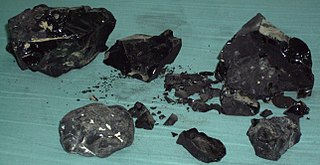
Bitumen is a sticky, black, highly viscous liquid or semi-solid form of petroleum. In the U.S., it is commonly referred to as asphalt. It may be found in natural deposits or may be a refined product, and is classed as a pitch. Before the 20th century, the term asphaltum was also used. The word is derived from the Ancient Greek ἄσφαλτος ásphaltos. The largest natural deposit of bitumen in the world, estimated to contain 10 million tons, is the Pitch Lake in southwest Trinidad.

Concrete is a composite material composed of fine and coarse aggregate bonded together with a fluid cement that hardens (cures) over time. Concrete is the second-most-used substance in the world after water, and is the most widely used building material. Its usage worldwide, ton for ton, is twice that of steel, wood, plastics, and aluminum combined. Globally, the ready-mix concrete industry, the largest segment of the concrete market, is projected to exceed $600 billion in revenue by 2025. This widespread use results in a number of environmental impacts. Most notably, the production process for cement produces large volumes of greenhouse gas emissions, leading to net 8% of global emissions. Other environmental concerns include widespread illegal sand mining, impacts on the surrounding environment such as increased surface runoff or urban heat island effect, and potential public health implications from toxic ingredients. Significant research and development is being done to try to reduce the emissions or make concrete a source of carbon sequestration, and increase recycled and secondary raw materials content into the mix to achieve a circular economy. Concrete is expected to be a key material for structures resilient to climate disasters, as well as a solution to mitigate the pollution of other industries, capturing wastes such as coal fly ash or bauxite tailings and residue.

Valle is a municipality in Agder county, Norway. It is located in the traditional district of Setesdal. The administrative centre of the municipality is the village of Valle. Other villages in Valle include Besteland, Brokke, Homme, Hovet, Rygnestad, Rysstad, and Uppstad.

Trøndelag is a county in the central part of Norway. It was created in 1687, then named Trondhjem County ; in 1804 the county was split into Nord-Trøndelag and Sør-Trøndelag by the King of Denmark-Norway, and the counties were reunited in 2018 after a vote of the two counties in 2016.

Asphalt concrete is a composite material commonly used to surface roads, parking lots, airports, and the core of embankment dams. Asphalt mixtures have been used in pavement construction since the beginning of the twentieth century. It consists of mineral aggregate bound together with bitumen, laid in layers, and compacted. The process was refined and enhanced by Belgian-American inventor Edward De Smedt.
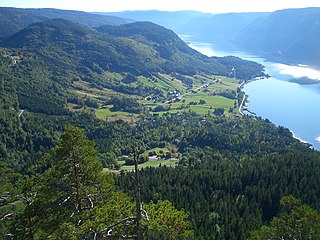
Setesdal is a valley and a traditional district in Agder County in southern Norway. It consists of the municipalities of Bykle, Valle, Bygland, Iveland, and Evje og Hornnes.

NCC AB is a Swedish construction company, the second largest in the Nordic region with annual revenues (2020) of 53,9 billion SEK and about 14 500 employees.

The Miller Group is a diverse transportation construction company based in Markham, Ontario, Canada where its Corporate Head Office is located. Its U.S. headquarters is located in Morrow, Georgia.
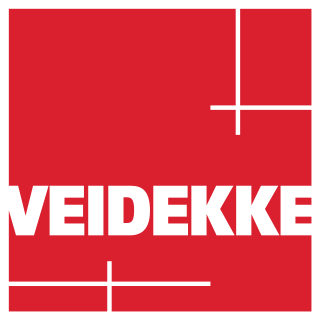
Veidekke is the largest Norwegian construction and civil engineering company and the fourth largest in Scandinavia. Veidekke's business involves a network of Scandinavia construction and engineering operations, rehabilitation work, major heavy construction contracts and development of dwellings for the company's own account as well as buildings for public use. They recently acquired Reinertsen's civil engineering arm. Other business segments are asphalt operations, production of crushed stone and gravel (aggregates) and maintenance of public roads.
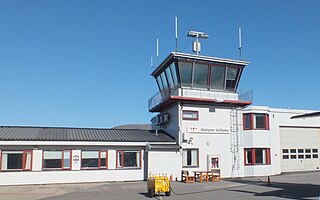
Mehamn Airport is a regional airport serving the village of Mehamn in Gamvik Municipality in Troms og Finnmark county, Norway. It also serves the villages Kjøllefjord and Gamvik. The airport is 2 kilometers (1.2 mi) outside of the village of Mehamn and is owned and operated by the state-owned Avinor. The tower is remotely controlled from Bodø.
Tarmac Group Limited was a British building materials company headquartered in Wolverhampton, United Kingdom. It produced road surfacing and heavy building materials including aggregates, concrete, cement and lime, as well as operating as a road construction and maintenance subcontractor.
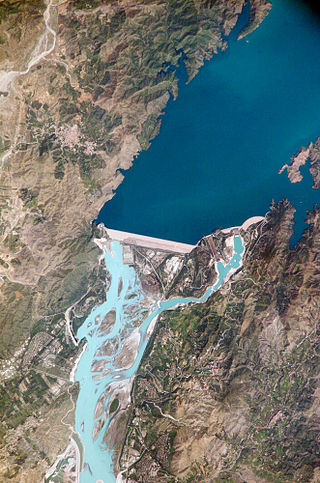
An embankment dam is a large artificial dam. It is typically created by the placement and compaction of a complex semi-plastic mound of various compositions of soil or rock. It has a semi-pervious waterproof natural covering for its surface and a dense, impervious core. This makes the dam impervious to surface or seepage erosion. Such a dam is composed of fragmented independent material particles. The friction and interaction of particles binds the particles together into a stable mass rather than by the use of a cementing substance.

Aggregate Industries, a member of the Holcim Group, is a company based in the United Kingdom with headquarters at Bardon Hill, Coalville, Leicestershire. Aggregate Industries manufactures and supplies a range of heavy building materials, primarily aggregates such as stone, asphalt and concrete, to the construction industry and other business sectors. Aggregate Industries also manufactures and imports cement, and provides a range of aggregate-associated goods and services, these include the manufacture of masonry and reconstructed stone items for construction industry and domestic applications, the manufacture of pre-cast concrete items, the supply of ready mixed concrete, design and project management consulting, and resurfacing contracting services.
Mesta AS is a Norwegian government enterprise delivering services within construction and civil engineering of roads. The company is owned by the Norwegian Ministry of Trade and Industry and has its headquarters at Lysaker outside Oslo. Marianne Bergmann Røren is the Chief Executive Officer of Mesta AS.
Jens Juell Wisløff was a Norwegian businessman in the asphalt industry and a politician for the Conservative Party.

Voss Airport, Bømoen is a general aviation airport located on the former Bømoen Base in Vossevangen in Voss Municipality in Vestland county, Norway. The airport consists of an asphalt 1,000-meter (3,300 ft) runway designated 09/27. The municipal airport is used by the helicopter operator Fonnafly as well as for hanggliding, parachuting and sailplane activities.
The Çetin Dam hydropower dam, on the Botan River in Siirt Province, Turkey, with an installed capacity of 420 MW. It was completed in 2020.
Plastic roads are roads that are made entirely from plastic or composites of plastic with other materials. Plastic roads are different from standard roads in the respect that standard roads are made from asphalt concrete, which consists of mineral aggregates and asphalt, while plastic roads are made of plastic. Most plastic roads sequester plastic waste within the asphalt as an aggregate. It is currently unknown how these aggregates will perform in the mid- to long-term, or what effect their degradation might have on surrounding ecosystems.
Isola is a manufacturer, distributor and installer of building materials. The company was founded in 1940 by Harald Thiis-Evensen in Oslo. The company HQ is now in Porsgrunn.












